外研版高中英语必修一Module 3 My First Ride on a Train Reading and Vocabulary课件 (共41张PPT)
文档属性
| 名称 | 外研版高中英语必修一Module 3 My First Ride on a Train Reading and Vocabulary课件 (共41张PPT) | 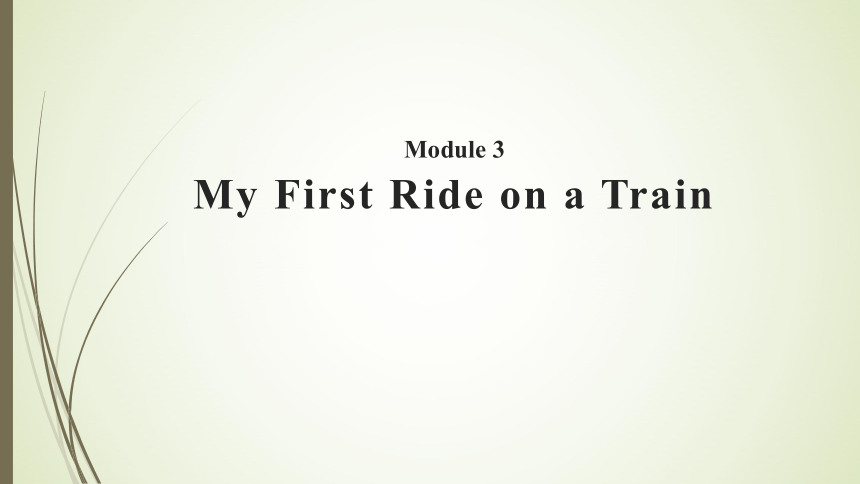 | |
| 格式 | zip | ||
| 文件大小 | 1.7MB | ||
| 资源类型 | 教案 | ||
| 版本资源 | 外研版 | ||
| 科目 | 英语 | ||
| 更新时间 | 2018-05-04 20:38:04 | ||
图片预览

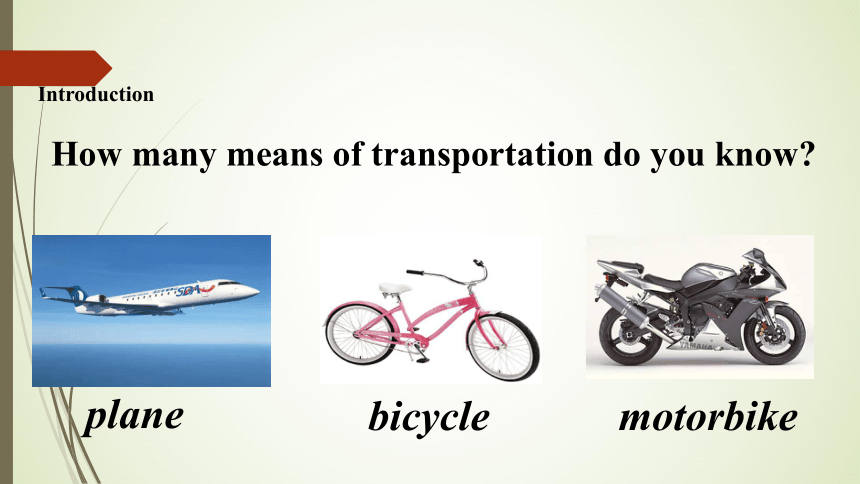
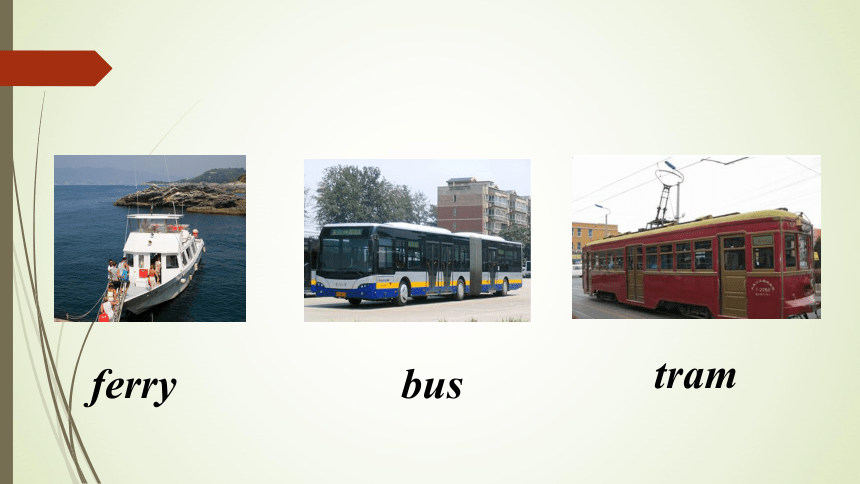
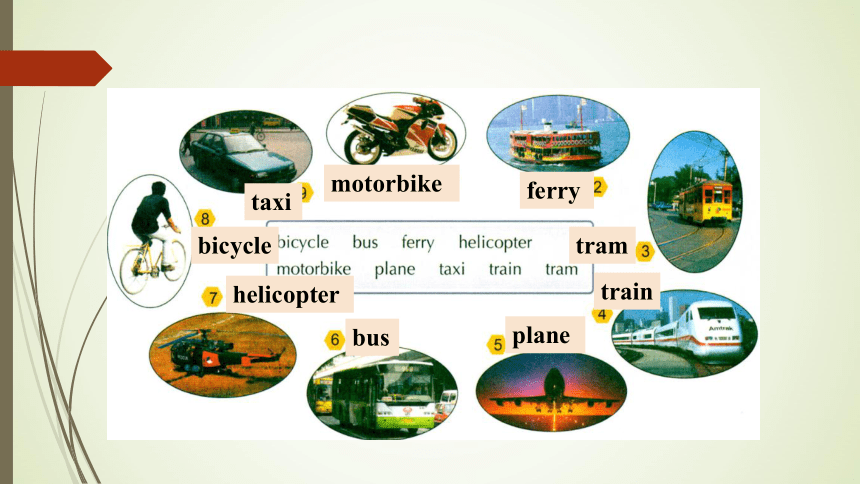
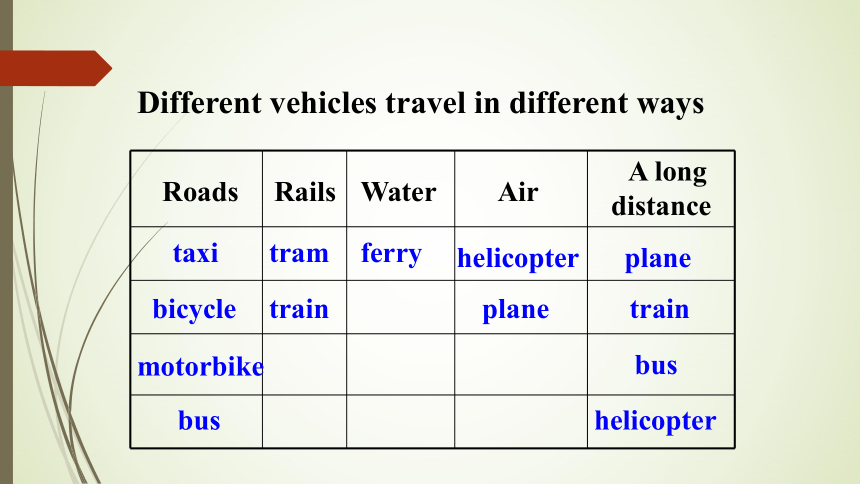
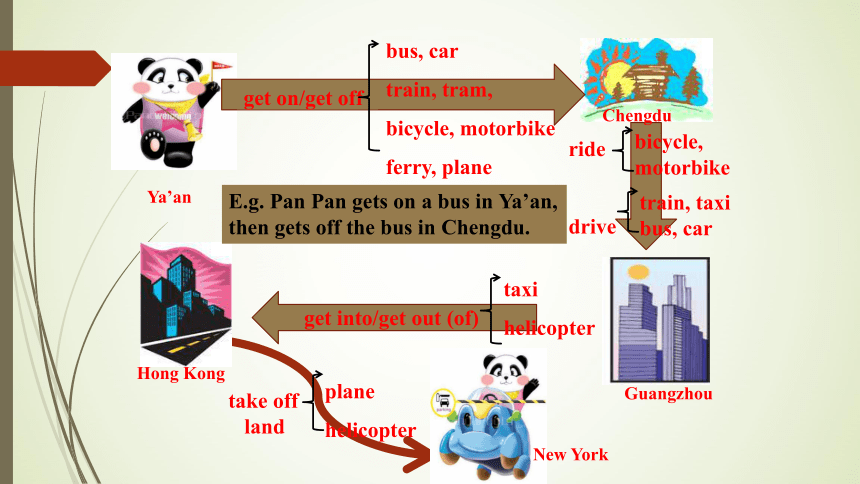
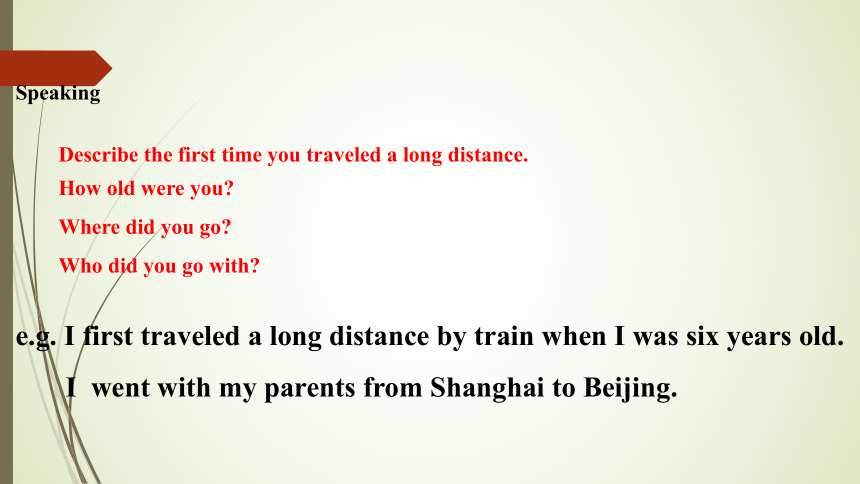
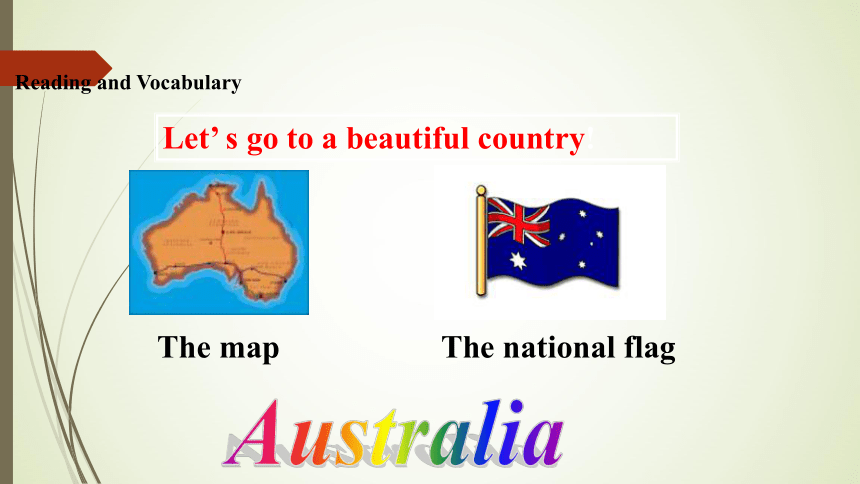
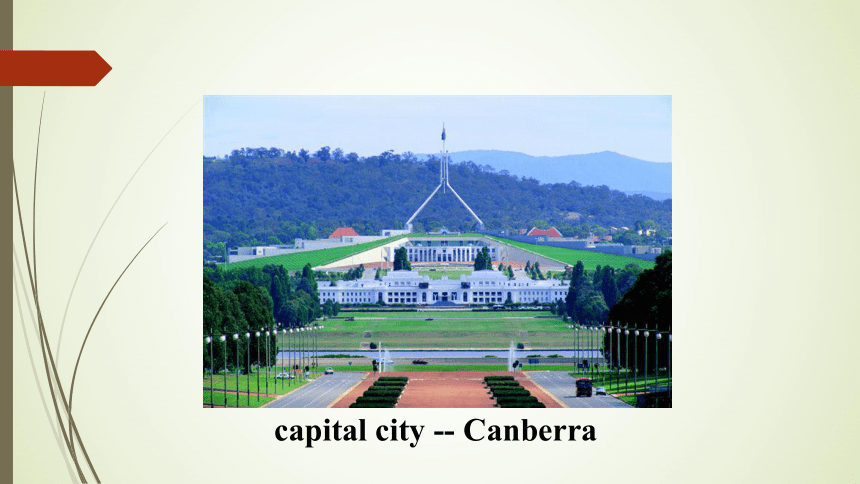
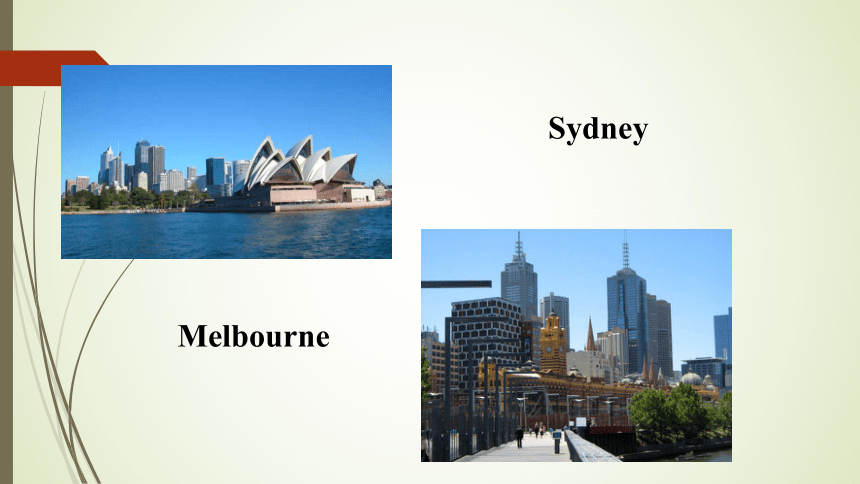
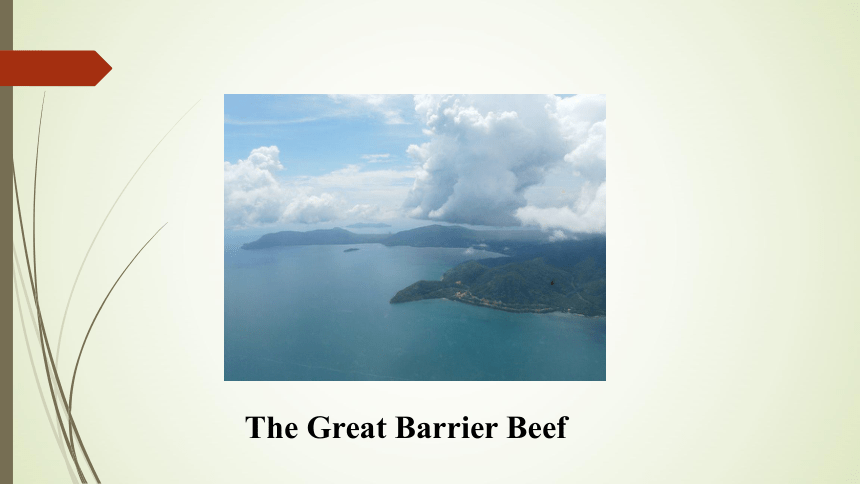
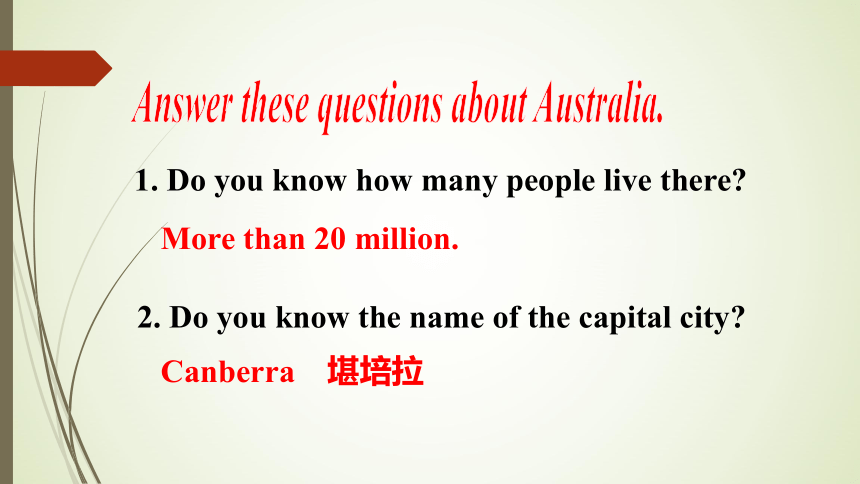
文档简介
课件41张PPT。How many means of transportation do you know?IntroductionplanebicyclemotorbikeferrybustramtaximotorbikeferrytramtrainplanebushelicopterbicycleDifferent vehicles travel in different waystaxibicyclemotorbikebusAirtramtrainferryhelicopterplaneplanetrainbushelicopterRoadsRailsWaterride
drive get into/get out (of)E.g. Pan Pan gets on a bus in Ya’an,
then gets off the bus in Chengdu.Ya’ane.g. I first traveled a long distance by train when I was six years old.
I went with my parents from Shanghai to Beijing. Describe the first time you traveled a long distance. How old were you?
Where did you go?
Who did you go with?SpeakingLet’ s go to a beautiful country!The mapThe national flagAustraliaReading and Vocabularycapital city -- CanberraSydneyMelbourneThe Great Barrier Beef1. Do you know how many people live there?2. Do you know the name of the capital city? Answer these questions about Australia.More than 20 million.Canberra 堪培拉3. Where do you think most of the people live, in the central part of the country or on the coast?
4. What do you think the central part of the country is like?On the east coast and the southeast coast.Many farms in the central part of the country, where farmers raise sheep and cattle.5. What Australian animals do you know about?Kangaroo
袋鼠Koala bear
树袋熊Duck-billed platypus
鸭嘴兽Dingo
澳洲野狗abandoned camels cassette clouds colourful desert diamonds distance experts famous farms fields food government law meal midnight passengers products recently sand scenery shine shoot soil supply weatherCheck the meaning of these words and match some of the words with these definitions.an area of land where it is always dry
______
2. valuable stones _________
3. people who travel on a train, bus or plane _________
4. you find this on beaches _____
5. white or grey things made of water in the sky _______
6. where plants grow ________________ desertdiamondspassengerssandcloudssoil / fields / farmsWhat’s the passage about?
A. a train to Sydney
B. taking the train to Australia
C. traveling to the central part of Australia
D. a child visiting her grandmotherParagraph 6 Paragraph 1Paragraph 2Paragraph 3Paragraph 4 Paragraph 5 How many parts can we divide the passage into? What is each about?I. Alice’s journey on the train.II. Alice’s experience and feeling.III. The history of the transportation in Australia.Read the passage again carefully and answer the questions. No, she traveled on the train recently.2. Was her destination on the coast of Australia? No, it was Alice Springs in the center of Australia.1. Did Alice travel on the train a long time ago?3. Was the scenery the same during the whole journey? No, at first there were fields, then it was desert.4. Did she study while she was on the train? Yes, she studied Chinese. Alice, an __________ girl, ___________ Sydney, Australia.
Recently, ___________ a friend she had her first ____ on a ____________ train. They spent two days and nights on the _______ Ghan train. 18-year-oldcomes fromtogether withlong- distancefamousrideFill in the blanks with proper words: Post-readingThe meals ______ by experts were great and the _______ was very ________.
They first saw fields ____ dark red soil, and then the _____.
There were even some _________ farms ____ more than a hundred years ago. cookedscenerycolourfuldesertwithabandonedbuilt
During the day, she ___ by the window, ____________ it, reading books or _______ to some cassettes. _______, she watched the stars ______ like diamonds.satlooking out ofAt nightshininglistening The reason _____the train is called the Ghan is that ______ camels from Afghanistan ____ nce _______ carry food and other supplies. ___________, a new railway line was built and the camels _______needed _________.whytrainedwereused toIn the 1920sweren’tany moreDiscussion1. What sort of people do you think travel on the Ghan train?
2. What kind of towns and villages do you think the train passed?The -ed form used as attributives-ed分词既可以作前置定语, 也可以作后置定语。1. 单个的过去分词作定语
1) 作前置定语: 这时过去分词的形容词意义强于动词意义。 Grammara. 及物动词的过去分词具有被动和完成意义。 如:
a broken cup 一个破杯子
a wounded soldier一名伤员
b. 不及物动词的过去分词具有主动和完成意义。
a grown woman一位成年妇女
an escaped prisoner一名逃犯2. 过去分词短语作定语通常后置,其作用相当于定语从句。如:
the color TV set produced last year =the color TV set that were produced last year
去年生产的彩色电视机
a letter written to me by my daughter =a letter that was written to me by my daughter 一封我女儿写给我的信2) 作后置定语,通常是及物动词的过去分词,这时过去分词意义强于形容词意义。个别单个的过去分词作前置定语或后置定语时, 表达的含义不同。3. 要注意过去分词做定语时动作发生的时间:
1) 发生在谓语动词的动作之前。如:
Is this the book written (that was written) by Henry James?
这是亨利·詹姆斯写的书吗? 2) 表示与句中谓语动词相应的经常性的动作。如:
He was then a professor respected (that was respected) by all the teachers and students of the college.
当时他是一个受这所大学里全体师生尊敬的教授。Don’t use words, expressions or phrases ____ only to people with specific knowledge. A. being known B. having been known C. to be known D. known语法练习2. Reading is an experience quite different from watching TV; there are pictures ____ in your mind instead of before your eyes. A. to form B. form
C. formed D. having formed3. There was an ____ look on his face when the actress appeared.
A. excited B. excitement
C. exciting D. excitedly
4. It’s wrong for the ___ countries to control the world.
A. development B. developing
C. developed D. develop5. I have collected the money ____.
A. needing B. need
C. to need D. needed
6. The bridge ___ next year will be very long.
A. being built B. to be built C. built D. buildingCulture cornerMagnetically levitated train
(磁悬浮列车)Read the passage and answer the question.What are the main differences between a magnetically levitated train and an ordinary train?First of all, the Maglev train is faster than an ordinary train. It is a high-speed train. Second, it has no wheels and no engine, it travels between two magnets, but an ordinary train has wheels in a vacuum and it must use engine to start. Third, the Maglev train causes less pollution than an ordinary train.Please turn to P82. First look at the picture and the title, predict what it is about. Work in groups and discuss it. I think it is about Chris’ first ride on an elephant.Can you imagine a travel on an elephant? What will it be like?That must be fantastic! I would like to have a try if possible.Homework
Write a paragraph to describe the first time you travelled a long distance. You can refer to the example on page 21 Activity 4.
drive get into/get out (of)E.g. Pan Pan gets on a bus in Ya’an,
then gets off the bus in Chengdu.Ya’ane.g. I first traveled a long distance by train when I was six years old.
I went with my parents from Shanghai to Beijing. Describe the first time you traveled a long distance. How old were you?
Where did you go?
Who did you go with?SpeakingLet’ s go to a beautiful country!The mapThe national flagAustraliaReading and Vocabularycapital city -- CanberraSydneyMelbourneThe Great Barrier Beef1. Do you know how many people live there?2. Do you know the name of the capital city? Answer these questions about Australia.More than 20 million.Canberra 堪培拉3. Where do you think most of the people live, in the central part of the country or on the coast?
4. What do you think the central part of the country is like?On the east coast and the southeast coast.Many farms in the central part of the country, where farmers raise sheep and cattle.5. What Australian animals do you know about?Kangaroo
袋鼠Koala bear
树袋熊Duck-billed platypus
鸭嘴兽Dingo
澳洲野狗abandoned camels cassette clouds colourful desert diamonds distance experts famous farms fields food government law meal midnight passengers products recently sand scenery shine shoot soil supply weatherCheck the meaning of these words and match some of the words with these definitions.an area of land where it is always dry
______
2. valuable stones _________
3. people who travel on a train, bus or plane _________
4. you find this on beaches _____
5. white or grey things made of water in the sky _______
6. where plants grow ________________ desertdiamondspassengerssandcloudssoil / fields / farmsWhat’s the passage about?
A. a train to Sydney
B. taking the train to Australia
C. traveling to the central part of Australia
D. a child visiting her grandmotherParagraph 6 Paragraph 1Paragraph 2Paragraph 3Paragraph 4 Paragraph 5 How many parts can we divide the passage into? What is each about?I. Alice’s journey on the train.II. Alice’s experience and feeling.III. The history of the transportation in Australia.Read the passage again carefully and answer the questions. No, she traveled on the train recently.2. Was her destination on the coast of Australia? No, it was Alice Springs in the center of Australia.1. Did Alice travel on the train a long time ago?3. Was the scenery the same during the whole journey? No, at first there were fields, then it was desert.4. Did she study while she was on the train? Yes, she studied Chinese. Alice, an __________ girl, ___________ Sydney, Australia.
Recently, ___________ a friend she had her first ____ on a ____________ train. They spent two days and nights on the _______ Ghan train. 18-year-oldcomes fromtogether withlong- distancefamousrideFill in the blanks with proper words: Post-readingThe meals ______ by experts were great and the _______ was very ________.
They first saw fields ____ dark red soil, and then the _____.
There were even some _________ farms ____ more than a hundred years ago. cookedscenerycolourfuldesertwithabandonedbuilt
During the day, she ___ by the window, ____________ it, reading books or _______ to some cassettes. _______, she watched the stars ______ like diamonds.satlooking out ofAt nightshininglistening The reason _____the train is called the Ghan is that ______ camels from Afghanistan ____ nce _______ carry food and other supplies. ___________, a new railway line was built and the camels _______needed _________.whytrainedwereused toIn the 1920sweren’tany moreDiscussion1. What sort of people do you think travel on the Ghan train?
2. What kind of towns and villages do you think the train passed?The -ed form used as attributives-ed分词既可以作前置定语, 也可以作后置定语。1. 单个的过去分词作定语
1) 作前置定语: 这时过去分词的形容词意义强于动词意义。 Grammara. 及物动词的过去分词具有被动和完成意义。 如:
a broken cup 一个破杯子
a wounded soldier一名伤员
b. 不及物动词的过去分词具有主动和完成意义。
a grown woman一位成年妇女
an escaped prisoner一名逃犯2. 过去分词短语作定语通常后置,其作用相当于定语从句。如:
the color TV set produced last year =the color TV set that were produced last year
去年生产的彩色电视机
a letter written to me by my daughter =a letter that was written to me by my daughter 一封我女儿写给我的信2) 作后置定语,通常是及物动词的过去分词,这时过去分词意义强于形容词意义。个别单个的过去分词作前置定语或后置定语时, 表达的含义不同。3. 要注意过去分词做定语时动作发生的时间:
1) 发生在谓语动词的动作之前。如:
Is this the book written (that was written) by Henry James?
这是亨利·詹姆斯写的书吗? 2) 表示与句中谓语动词相应的经常性的动作。如:
He was then a professor respected (that was respected) by all the teachers and students of the college.
当时他是一个受这所大学里全体师生尊敬的教授。Don’t use words, expressions or phrases ____ only to people with specific knowledge. A. being known B. having been known C. to be known D. known语法练习2. Reading is an experience quite different from watching TV; there are pictures ____ in your mind instead of before your eyes. A. to form B. form
C. formed D. having formed3. There was an ____ look on his face when the actress appeared.
A. excited B. excitement
C. exciting D. excitedly
4. It’s wrong for the ___ countries to control the world.
A. development B. developing
C. developed D. develop5. I have collected the money ____.
A. needing B. need
C. to need D. needed
6. The bridge ___ next year will be very long.
A. being built B. to be built C. built D. buildingCulture cornerMagnetically levitated train
(磁悬浮列车)Read the passage and answer the question.What are the main differences between a magnetically levitated train and an ordinary train?First of all, the Maglev train is faster than an ordinary train. It is a high-speed train. Second, it has no wheels and no engine, it travels between two magnets, but an ordinary train has wheels in a vacuum and it must use engine to start. Third, the Maglev train causes less pollution than an ordinary train.Please turn to P82. First look at the picture and the title, predict what it is about. Work in groups and discuss it. I think it is about Chris’ first ride on an elephant.Can you imagine a travel on an elephant? What will it be like?That must be fantastic! I would like to have a try if possible.Homework
Write a paragraph to describe the first time you travelled a long distance. You can refer to the example on page 21 Activity 4.
